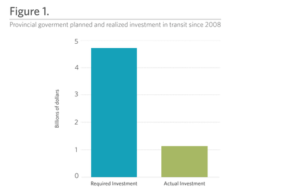
VANCOUVER — As billions of dollars in federal investments for transit infrastructure sit on the bargaining table, a new report by the David Suzuki Foundation sheds light on the B.C. government’s pattern of underfunding for transit projects. Analysis of budget documents reveals that the province has fallen far short of the investments it committed to with the launch of the 2008 Provincial Transit Plan, and this trend has continued in current talks between the B.C. government and Metro Vancouver mayors.
Download the full report here.
“This report suggests that systematic underfunding of transit by the provincial government has contributed to the congestion that people face every day in densely populated areas like Metro Vancouver,” said David Suzuki Foundation CEO Peter Robinson. “While other transportation projects like roads and bridges are going ahead without delay, transit infrastructure has been put on an uneven playing field as the province continues to provide insufficient financial support.”
On May 26, the B.C. government announced one-third funding support for the transit plan developed by Metro Vancouver’s mayors — much less than what it suggested was its fair share for the 2008 plan. Mayors and stakeholders have criticized the new commitment for failing to address a crucial funding gap while jeopardizing the region’s share of new federal funds for up to half the cost of transit projects. The mayors have argued that the province must also deploy new revenue tools to raise an additional seven per cent. This would bring the provincial funding share to 40 per cent.
“Local governments are limited in what they can do to fund these kinds of projects,” said David Suzuki Foundation science and policy director Ian Bruce. “The provincial government needs to work with the region’s mayors beyond what they’ve agreed to so far if we’re to have a hope of securing matching federal funds for these projects.”
The new report suggests that if the B.C. government committed the same level of funding it proposed in 2008, but supported it with a detailed fiscal plan, the province would have already secured recently committed federal infrastructure funds. In fact, the provincial investment needed today is less than what the province itself suggested was its fair share under the previous plan (40 per cent versus 43 per cent).
“This report underscores the fact that these new federal funds represent a crucial opportunity to turn the tide on vital transit investment in B.C.,” Bruce added. “But the window of opportunity will close soon and the B.C. government needs to make sure its fastest-growing region doesn’t lose out.”
Metro Vancouver is expected to add one million new residents by 2040, and roads and transit networks are already near capacity. Costs related to traffic congestion in Metro Vancouver are estimated to be as high as $1.3 billion per year.
Media Contacts:
David Suzuki Foundation — Steve Kux: 604-374-4102
David Suzuki Foundation — Theresa Beer: 778-874-3396